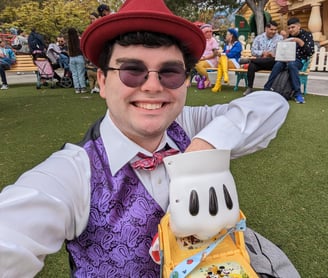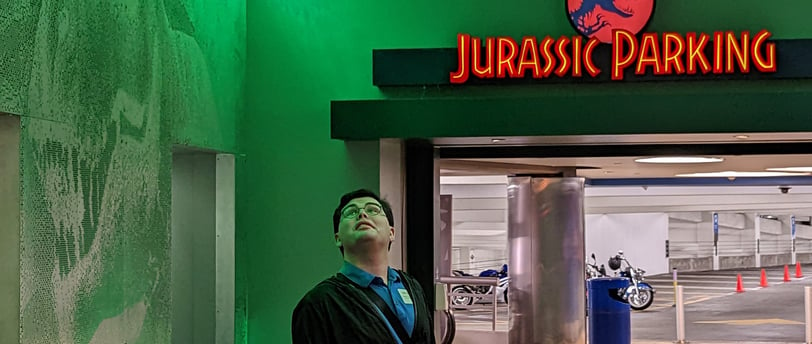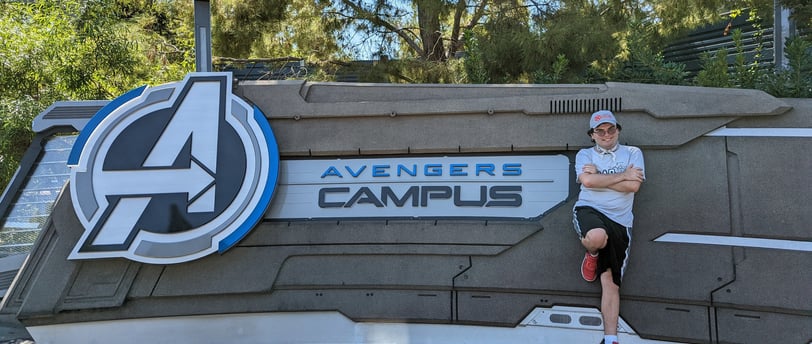Building Real World Skills
How Theme Parks Can Help Neurodivergent Individuals Thrive


As a person on the Autism Spectrum, I have always found theme parks to be a fascinating world. In fact, I have been going to theme parks since I was just six weeks old, and my obsession with them has only grown over time. From Disneyland to Universal Studios, Knott's Berry Farm to Alton Towers, my daily life revolves around learning about the latest rides, shows, and characters at theme parks around the world. I even have an extensive bookshelf dedicated to the history of attractions and the designers behind them.
But why do I love theme parks so much, and why have they become the ultimate testing grounds for me as a person? It all comes down to the way that theme parks are designed with the guest in mind. When Disney builds a new ride or themed land, they put a lot of effort into designing the look and feel of their environment. These rides and lands make you forget that you are in a theme park and instead make you feel like you are someone on your own adventure.
For individuals on the Autism Spectrum like myself, everyday social situations can feel like skydiving without any preparation. School, work, and even shopping can be hard to manage, but at a theme park, I can deal with all kinds of real-world situations that normally would cause anxiety, with a twist: all of these situations are pretend and meant to be fun once you go through a theme park's gates.
Standing in line to buy a new iPhone sounds like an absolute nightmare to me. But standing in line to ride the Haunted Mansion at Disneyland? I am already on board. Theme parks allow individuals like me to test new experiences and sensations in a safe and controlled environment. This is why I have been more willing to try new things in theme parks - things that I could later try out in my everyday life.
Before I started signing up for clubs at school or joining late-night gaming groups, I was hanging out with friends and fan groups at fan dress-up days at Disneyland. I started learning the basics of car control and rules of the road by driving through Autopia - last fall at 24 years old, I finally got my learner's permit. Food that I never would have expected I would like, I tried at places like the Tropical Hideaway and the Lucky Fortune Cookery. And, of course, I learned that something that looked scary, like an elevator that drops you several stories or a warehouse filled with vicious monsters, didn't have to be scary but could rather be fun. Once I started realizing that I could do these things at a theme park, then I could start doing them in my daily life.
These experiences have helped me a lot, but they are not worth as much if I can't share what I have learned from them with others. That's why I started my YouTube channel about two months ago. At the time, I was heading towards being nearly two years out of college, looking for jobs in the tech sector as a programmer.
Despite my education and skills as a programmer (I currently know 12 coding languages), I have had a hard time finding work. Most of the jobs I look at are not within my special interests, so I often appear uninterested or I don't even apply. I have applied for tutoring and retail jobs to improve my social skills, but these jobs felt way below what I can do.
When I manage to get to a job interview, I try to be as presentable as possible - dress nicely, comb my hair, etc. But several of my persistent mannerisms come through that show my discomfort - typical Autistic tics like blinking, stammering, and hand movements (also known as "stimming”).
So, I decided to take matters into my own hands and use my skills to create something that could help others like me. That's how I came up with the idea of creating a YouTube channel focused on neurodivergent issues at theme parks.
I realize that many Autistic people and other neurodivergent individuals struggle with sensory overload and anxiety in social situations, which can make visiting theme parks difficult. I wanted to create a resource that could help them navigate these challenges and enjoy their experiences to the fullest.
On my YouTube channel, I share my own experiences and tips for managing sensory overload, anxiety, and other challenges that can arise in theme park settings. I also interview other neurodivergent individuals and experts in the field to provide a broader perspective and share diverse experiences.
By creating this channel, I hope to create a space where neurodivergent individuals can learn from each other, find support, and feel empowered to pursue their interests and passions.
Theme parks have been a significant part of my life and have helped me develop new skills and overcome challenges. I believe that they can be a valuable resource for other neurodivergent individuals as well, providing a safe and fun environment to explore new experiences and learn about themselves.
Through my YouTube channel, I hope to inspire others to embrace their interests and passions, to try new things, and to know that they are not alone in their struggles. With the right support and resources, anyone can thrive and succeed, regardless of their neurodivergent traits.
So, if you are a neurodivergent individual who loves theme parks or wants to learn more about how to navigate them, check out my channel and join our community. Together, we can make the world a more inclusive and welcoming place for everyone.
The original text for this article is from a speech that I gave for the OCLPA on 04/20/2023. I have adapted part of that speech into this article. I plan on using other parts of the speech to more deeply develop other ideas that were touched on during that speech.









